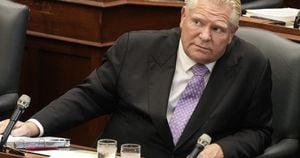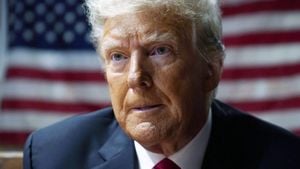Recent debates around U.S. economic policy are heating up as key political figures put forward their strategies to address inflation and healthcare costs. Notably, Vice President Kamala Harris is introducing new proposals aimed at alleviating the financial burden on everyday Americans.
On August 16, 2024, Harris unveiled comprehensive plans to cut various taxes and reduce the costs associated with groceries, housing, and other necessities. This initiative is seen as her bid to counteract economic criticisms stemming from the opposition and address concerns over rising living expenses.
While Democrats aim to present Harris's proposals as proactive measures, these initiatives coincide with challenges faced by the Biden administration. Harris's plans could be pivotal as she embarks on her presidential campaign, especially following President Biden's withdrawal from the race.
Harris's approach includes specific provisions targeting food prices, wherein she has called for prohibiting "price gouging" by suppliers and grocery stores. This strategy signals her intention to tackle inflation directly, setting her apart from previous administration policies.
Price gouging — the act of raising prices to unfair levels, particularly for essentials during emergencies or supply shortages — has become increasingly scrutinized. Harris's proposed ban aims to protect consumers from exploitation by companies seeking to capitalize on challenging economic conditions.
The Vice President's economic proposals are expected to encompass additional measures beyond just price regulation. Harris plans to provide targeted tax breaks to low and middle-income families, hoping to ease the financial strain felt by many households.
Among the critical components of Harris's proposal is the potential introduction of tax incentives for grocery manufacturers who maintain reasonable pricing. This could encourage businesses to pass savings onto consumers, thereby reducing the financial impact on American families.
Despite these proposals aiming to position Harris favorably against Republican critiques, skepticism exists. Critics argue whether such measures would effectively tackle the broader issues of inflation and high living costs the country is currently facing.
On another front, Massachusetts Governor Maura Healey announced agreements aimed at preserving the operation of four hospitals at risk of closure. Governor Healey's deals are seen as critical steps to maintain healthcare access for residents, particularly amid rising concerns over hospital availability.
These agreements follow previous announcements about potential hospital closures, which raised alarms within local communities. Healey's efforts reflect the broader tension between healthcare accessibility and economic sustainability, as funding for these facilities is often strained.
Similar to Harris's proposals, Healey's actions highlight the importance of state-level interventions to safeguard public health services. Thus, economic policy discussions continue to resonate locally as well as nationally.
While Healey works on healthcare issues, the overarching theme of economic resilience remains. The juxtaposition of Harris's national proposals with Healey's local actions emphasizes the interconnected nature of economic policy across various governance levels.
Overall, both Harris and Healey are actively tackling pressing economic challenges, but their approaches may invite differing receptions. Harris’s proposed new tax breaks may bolster her standing among Democratic voters, but Republican opponents are likely to scrutinize the feasibility of such initiatives.
On the national stage, debates around proposed measures are expected to ramp up as we approach election season. All eyes will be on potential impacts these plans and state-level interventions have on voters and their perceptions of governmental capability to address economic issues.
Hence, as midterm elections draw closer, the focus on economic narratives — from healthcare access to grocery pricing — will be pivotal for both parties. These discussions are more than policy changes; they are integral to candidates establishing their leadership viability and earning public trust.



